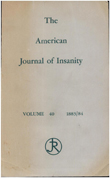Postpartum prophylaxis for women with bipolar disorder
Abstract
OBJECTIVE: The postpartum period has typically been considered a time of heightened vulnerability for development of affective disorders, and women with bipolar disorder have consistently demonstrated vulnerability to puerperal worsening of mood. This retrospective study examined the extent to which mood-stabilizing agents provide prophylactic benefit to bipolar women during the postpartum period. METHOD: The clinical course of 27 women meeting the DSM-III-R criteria for bipolar disorder was followed during pregnancy and the postpartum period. Information regarding severity of illness (as measured by number of episodes of mania, depression, or both) was obtained, in addition to data on pharmacotherapy (if any) received before, during, and after pregnancy. The extent to which the prophylactic use of antimanic agents minimized the risk of relapse was explored. RESULTS: Only one of the 14 patients taking prophylactic agents during the acute puerperium relapsed within the first 3 months postpartum, while eight of the 13 who did not receive antimanic drugs showed evidence of recurrent affective instability during those 3 months. A survival analysis indicated that the women receiving prophylactic treatment with mood stabilizers maintained well-being significantly longer than the women who did not receive such treatment. CONCLUSIONS: Women with bipolar disorder appear to benefit from puerperal prophylaxis with mood stabilizers. Consistent with results of earlier studies, postpartum prophylaxis was associated with lower rates of relapse into affective disorders. The findings have implications for the early identification and treatment of subgroups of women at particular risk for puerperal illness.
Access content
To read the fulltext, please use one of the options below to sign in or purchase access.- Personal login
- Institutional Login
- Sign in via OpenAthens
- Register for access
-
Please login/register if you wish to pair your device and check access availability.
Not a subscriber?
PsychiatryOnline subscription options offer access to the DSM-5 library, books, journals, CME, and patient resources. This all-in-one virtual library provides psychiatrists and mental health professionals with key resources for diagnosis, treatment, research, and professional development.
Need more help? PsychiatryOnline Customer Service may be reached by emailing [email protected] or by calling 800-368-5777 (in the U.S.) or 703-907-7322 (outside the U.S.).



